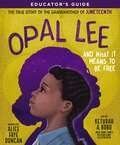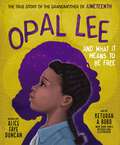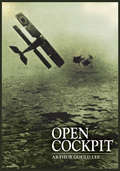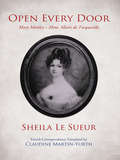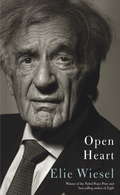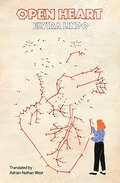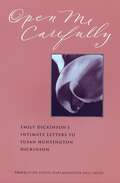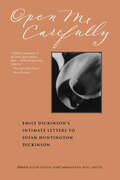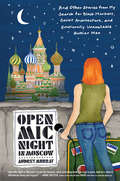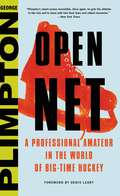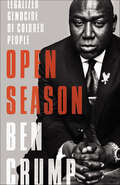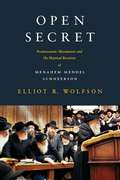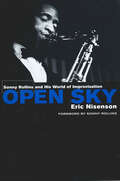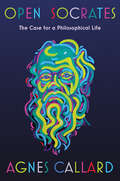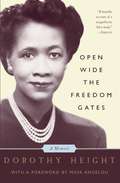- Table View
- List View
Opal Lee and What It Means to Be Free Educator's Guide: The True Story of the Grandmother of Juneteenth
by Alice Faye DuncanOpal Lee and What It Means to Be Free Educator's Guide is a companion to Opal Lee and What It Means to Be Free by Alice Faye Duncan. This guide can be utilized in the classroom, in a home school setting, or by parents seeking additional resources. Ideal for age 4-8.
Opal Lee and What It Means to Be Free: The True Story of the Grandmother of Juneteenth
by Alice Faye DuncanBlack activist Opal Lee had a vision of Juneteenth as a holiday for everyone. This true story celebrates Black joy and inspires children to see their dreams blossom. Growing up in Texas, Opal knew the history of Juneteenth, but she soon discovered that many Americans had never heard of the holiday. Join Opal on her historic journey to recognize and celebrate "freedom for all." <P><P> Every year, Opal looked forward to the Juneteenth picnic—a drumming, dancing, delicious party. She knew from Granddaddy Zak's stories that Juneteenth celebrated the day the freedom news of President Lincoln's Emancipation Proclamation finally sailed into Texas in 1865—over two years after the president had declared it! But Opal didn't always see freedom in her Texas town. Then one Juneteenth day when Opal was twelve years old, an angry crowd burned down her brand-new home. This wasn't freedom at all. She had to do something! But could one person’s voice make a difference? Could Opal bring about national recognition of Juneteenth? Follow Opal Lee as she fights to improve the future by honoring the past. <P><P><i>Advisory: Bookshare has learned that this book offers only partial accessibility. We have kept it in the collection because it is useful for some of our members. Benetech is actively working on projects to improve accessibility issues such as these.</i>
Opal: The Journal of an Understanding Heart
by Opal WhiteleyA lyrical, lovely, and deeply touching adaptation of an authentic journal kept by an orphaned six-year-old girl--later believed to be a French princess--living in an Oregon lumber camp at the turn of the century. 24 black-and-white photographs.
Open Book
by Jessica SimpsonThe #1 New York Times BestsellerJessica reveals for the first time her inner monologue and most intimate struggles. Guided by the journals she's kept since age fifteen, and brimming with her unique humor and down-to-earth humanity, Open Book is as inspiring as it is entertaining.This was supposed to be a very different book. Five years ago, Jessica Simpson was approached to write a motivational guide to living your best life. She walked away from the offer, and nobody understood why. The truth is that she didn’t want to lie.Jessica couldn’t be authentic with her readers if she wasn’t fully honest with herself first.Now America’s Sweetheart, preacher’s daughter, pop phenomenon, reality tv pioneer, and the billion-dollar fashion mogul invites readers on a remarkable journey, examining a life that blessed her with the compassion to help others, but also burdened her with an almost crippling need to please. Open Book is Jessica Simpson using her voice, heart, soul, and humor to share things she’s never shared before.First celebrated for her voice, she became one of the most talked-about women in the world, whether for music and fashion, her relationship struggles, or as a walking blonde joke. But now, instead of being talked about, Jessica is doing the talking. Her book shares the wisdom and inspirations she’s learned and shows the real woman behind all the pop-culture cliché’s — “chicken or fish,” “Daisy Duke,” "football jinx," “mom jeans,” “sexual napalm…” and more. Open Book is an opportunity to laugh and cry with a close friend, one that will inspire you to live your best, most authentic life, now that she is finally living hers.
Open Cockpit: A Pilot Of The Royal Flying Corps
by Arthur Gould LeeA riveting firsthand account of training for—and surviving—air combat during World War I, by the author of No Parachute. Thanks to a broken leg during flight school, Arthur Gould Lee gained valuable time flying trainers before he was posted in France during World War I. In November 1917 during low-level bombing and strafing attacks, he was shot down three times by ground fire. He spent eight months at the front and accumulated 222 hours of flight time in Sopwith Pups and Camels during a staggering 118 patrols, and engaged in combat 56 times. And yet he lived to retire from the RAF as an air vice-marshal in 1946. Lee puts you in the cockpit in this compelling personal account of life as a fighter pilot at the front. At turns humorous and dramatic, this thoughtful, enlightening memoir is a classic of military aviation.
Open Every Door: Mary Mottley – Mme. Marie de Tocqueville
by Sheila Le Sueur Claudine Martin-YurthMary Mottley, or Mme. Marie de Tocqueville, the English wife of French political thinker and historian Alexis de Tocqueville, seemed to be buried in the dustbins of 19th century French history until Sheila Le Sueur came along. Upon coming to the U.S. from Jersey, where Sheila survived the Nazi Occupation, Sheila was determined to learn everything she could about democracy. Her research eventually brought her to a C-SPAN series about Alexis de Tocqueville based on his classic, Democracy in America. Eventually Sheila learned that Tocqueville was married, but none of the biographers seemed to have much information about his wife, Mary Mottley. Writes Sheila: "Most biographers and Tocqueville analysts delivered the polite message that information about Mary Mottley was not a welcome contribution to the Tocqueville family legacy. Therefore, the less said about her, the better. I was incensed. This seemed to be highly unfair. For some reason, I didn't believe Alexis's choice of a lifetime partner was wrong for him. I felt Mary Mottley must have been an admirable person in her own right, and I set about to learn more about her." A special touch to this extraordinary book about a woman who Sheila learned was indeed a true soulmate for her husband, is a generous sample of Alexis's letters to Mary, translated from the French by Claudine Martin-Yurth. Alexis's love letters to Mary confirm without a doubt that the two were true friends, confidantes and kindred spirits.
Open Heart
by Elie Wiesel Marion WieselTranslated by Marion WieselA profoundly and unexpectedly intimate, deeply affecting summing up of his life so far, from one of the most cherished moral voices of our time.Eighty-two years old, facing emergency heart surgery and his own mortality, Elie Wiesel reflects back on his life. Emotions, images, faces and questions flash through his mind. His family before and during the unspeakable Event. The gifts of marriage and children and grandchildren that followed. In his writing, in his teaching, in his public life, has he done enough for memory and the survivors? His ongoing questioning of God--where has it led? Is there hope for mankind? The world's tireless ambassador of tolerance and justice has given us this luminous account of hope and despair, an exploration of the love, regrets and abiding faith of a remarkable man.
Open Heart
by Jay NeugeborenThe shared qualities of friendship and the healing arts are the subject of this riveting memoir of one man's battle with heart disease. When, in February 1999, Jay Neugeboren discovered he needed emergency quintuple-bypass surgery, he embarked on a journey that just began on the operating table. At sixty, he was the picture of health, swimming a mile a day and playing tennis and basketball regularly -- often with teenagers. How could he possibly have heart disease? But as he soon came to know, the difference between being healthy and being sick, and between receiving good care and receiving misdiagnoses, can be alarmingly narrow. Fortunately, on his side were four lifelong friends, all prominent physicians -- a cardiologist, a psychologist, a neurologist, and one of the world's pioneers in AIDS medicine -- who helped him sift through the contradictory advice and the uneasiness one feels when life lies in the hands of strangers who are doctors. Guiding him through the system and relying on the strength of their childhood bonds, born from their Brooklyn upbringing, his friends in effect saved his life and opened his eyes to the ways -- good, bad, miraculous, and at times chilling -- in which medicine is practiced in the United States today. In this book, Jay sets out to understand how and why he nearly died, and to find out what we know -- and don't know -- about disease and illness in general. Joined by his friends, each of whom reflects on his own life as a physician, Jay examines the faith many of us place in the advanced technologies of modern medicine and how that often distracts us from the most fundamental health care tool -- an engaged physician who listens and cares. What he discovers, in part, is that the qualities that lie at the heart of friendship also define what we hope for, and are losing, in our doctors. At a time when our health care system continues to disappoint, Open Heart will resonate with every patient who has been shuttled between specialists, with every physician who has faced impossible time constraints and technologies, and with everyone who has helped a loved one through the maze of health care choices. Clear, compelling, comic, and inspiring, Open Heart is a story that will open eyes and hearts -- a memoir every patient, doctor, and care provider will want to read.
Open Heart, Open Mind
by Clara HughesFrom one of Canada's most decorated Olympians comes a raw but life-affirming story of one woman's struggle with depression.In a world where winning meant everything, her biggest competitor was herself. In 2006, when Clara Hughes stepped onto the Olympic podium in Torino, Italy, she became the first and only athlete ever to win multiple medals in both Summer and Winter Games. Four years later, she was proud to carry the Canadian flag at the head of the Canadian team as they participated in the opening ceremony of the Vancouver Olympic Winter Games. But there's another story behind her celebrated career as an athlete, behind her signature billboard smile. While most professional athletes devote their entire lives to training, Clara spent her teenage years using drugs and drinking to escape the stifling home life her alcoholic father had created in Elmwood, Winnipeg. She was headed nowhere fast when, at sixteen, she watched transfixed in her living room as gold medal speed skater Gaétan Boucher effortlessly raced in the 1988 Calgary Olympics. Dreaming of one day competing herself, Clara channeled her anger, frustration and raw ambition into the endurance sports of speed skating and cycling. By 2010, she had become a six-time Olympic medalist. But after more than a decade in the gruelling world of professional sports that stripped away her confidence and bruised her body, Clara began to realize that her physical extremes, her emotional setbacks, and her partying habits were masking a severe depression. After winning bronze in the last speed skating race of her career, she decided to retire from that sport, determined to repair herself. She has emerged as one of our most committed humanitarians, advocating for a variety of social causes both in Canada and around the world. In 2010, she became national spokesperson for Bell Canada's Let's Talk campaign in support of mental health awareness, using her Olympic standing to share the positive message of the power of forgiveness. Told with honesty and passion, Open Heart, Open Mind is Clara's personal journey through physical and mental pain to a life where love and understanding can thrive. This revelatory and inspiring story will touch the hearts of all Canadians.
Open Heart: A Novel
by Elvira LindoThis intimate family novel that follows the rise and fall of a great love is also a moving tribute to the generation that struggled to survive in Spain after the Civil War.In Open Heart, Elvira Lindo tells the story of her parents—the story of an excessive love, passionate and unstable, forged through countless fights and reconciliations, which had a profound effect on their entire family. Manuel Lindo came from nothing, but stubbornly worked his way up at the Dredging and Construction Company. Obliged to move from city to city for his job, the family couldn&’t put down roots, and Elvira and her siblings&’ childhood was marked by unpredictability. As they pass through temporary homes, they&’re caught between Manuel&’s outsized temper and their young mother&’s worsening illness, which would tragically take her life. Beginning with nine-year-old Manuel&’s experience in Madrid in 1939, Open Heart takes us on a sweeping journey through Spain full of beautifully observed insights about love in its many forms.
Open House: A Life in 32 Moves
by Jane ChristmasMoving house has never flustered author Jane Christmas. She loves houses: viewing them, negotiating their price, dreaming up interior plans, hiring tradespeople to do the work and overseeing renovations. She loves houses so much that she’s moved thirty-two times.There are good reasons for her latest house move, but after viewing sixty homes, Jane and her husband succumb to the emotional fatigue of an overheated English housing market and buy a wreck in the town of Bristol that is overpriced, will require more money to renovate than they have and that neither of them particularly like.As Jane’s nightmare renovation begins, her mind returns to the Canadian homes where she grew up with parents who moved and renovated constantly around the Toronto area. Suddenly, the protective seal is blown off Jane’s memory of a strict and peripatetic childhood and its ancillary damage—lost friends, divorces, suicide attempts—and the past threatens to shake the foundations of her marriage. This latest renovation dredges a deeper current of memory, causing Jane to question whether in renovating a house she is in fact attempting to renovate her past.With humour and irreverence, Open House reveals that what we think we gain by constantly moving house actually obscures the precious and vital parts of our lives that we leave behind. This is a memoir that will appeal to anyone whose pulse quickens at the mere mention of real estate.
Open Look: Canadian Basketball and Me
by Jay TrianoA thoughtful, entertaining memoir about one of Canada’s most decorated basketball stars, his love of the sport, and the rise of basketball in Canada.As a child growing up in Niagara Falls, Ontario, Jay Triano did what everyone else in the city did on Friday nights: he went to watch basketball. Along with dozens of other fans, Jay and his family would crowd into the gymnasium of the local high school. Of all the places in the world, Jay only ever wanted to be courtside, surrounded by the game he loved with the roar of the crowd behind him. Jay never lost that passion for the game. A talented basketball player, Jay competed at the highest levels of the sport. He broke school records, traveled the world with the national team, and twice played against some of basketball’s biggest stars at the Olympics, all in the hopes of one day becoming a professional athlete. But the road wasn’t always smooth. Basketball was in its infancy in Canada, and Jay’s options were limited. Jack Donohue, the imposing forefather of the national game in Canada, held the fortunes of many players in his hands, and he tested the mettle of those around him. Throughout it all, Jay’s love of the sport drove him onward. As Jay matured, so too did the game of basketball in Canada, from humble origins in quiet communities to international competitions and the peak of the professional game. Along the way, Jay drew inspiration from the remarkable people in his life. When he was playing at university, Jay’s trainer was a young man named Terry Fox, who showed Jay the true meanings of discipline, gratitude, and giving back. Years later, when Jay was coaching Olympic and NBA teams, it was those same lessons that helped him realize that he wasn’t just shaping athletes; he was shaping a new generation. Told with honesty, warmth, and passion, Jay Triano’s story is an uplifting reminder of what it means to love a sport and a country.
Open Me Carefully: Emily Dickinson's Intimate Letters to Susan Huntington Dickinson
by Emily Dickinson Martha Nell Smith Ellen Louise HartFor the first time, selections from Emily Dickinson's thirty-six year correspondence to her neighbor and sister-in-law, Susan Huntington Dickinson, are compiled in a single volume. Open Me Carefully invites a dramatic new understanding of Emily Dickinson's life and work, overcoming a century of censorship and misinterpretation. This remarkable correspondence brings to light Susan Huntington Dickinson as the central source of the poet's passion and inspiration, and as her primary reader and literary companion. Gone is Emily as the precious recluse spinster of Amherst. Here is Dickinson in her own words—humorous, playful, passionate, and fully alive.
Open Me Carefully: Emily Dickinson's Intimate Letters to Susan Huntington Dickinson
by Emily DickinsonThe 19th–century American poet&’s uncensored and breathtaking letters, poems, and letter-poems to her sister-in-law and childhood friend. For the first time, selections from Emily Dickinson&’s thirty-six year correspondence with her childhood friend, neighbor, and sister-in-law, Susan Huntington Dickinson, are compiled in a single volume. Open Me Carefully invites a dramatic new understanding of Emily Dickinson&’s life and work, overcoming a century of censorship and misinterpretation. For the millions of readers who love Emily Dickinson&’s poetry, Open Me Carefully brings new light to the meaning of the poet&’s life and work. Gone is Emily as lonely spinster; here is Dickinson in her own words, passionate and fully alive. Praise for Open Me Carefully&“With spare commentary, Smith . . . and Hart . . . let these letters speak for themselves. Most important, unlike previous editors who altered line breaks to fit their sense of what is poetry or prose, Hart and Smith offer faithful reproductions of the letters&’ genre-defying form as the words unravel spectacularly down the original page.&” —Renee Tursi, The New York Times Book Review
Open Mic Night in Moscow: And Other Stories from My Search for Black Markets, Soviet Architecture, and Emotionally Unavailable Russian Men
by Audrey MurrayThe raucous and surprisingly poignant story of a young, Russia-obsessed American writer and comedian who embarked on a solo tour of the former Soviet Republics, never imagining that it would involve kidnappers, garbage bags of money, and encounters with the weird and wonderful from Mongolia to Tajikistan.Kazakhstan, Belarus, and Siberia are not the typical tourist destinations of a twenty-something, nor the places one usually goes to eat, pray, and/or love. But the mix of imperial Russian opulence and Soviet decay, and the allure of emotionally unavailable Russian men proved strangely irresistible to comedian Audrey Murray.At age twenty-eight, while her friends were settling into corporate jobs and serious relationships, Audrey was on a one-way flight to Kazakhstan, the first leg of a nine-month solo voyage through the former USSR. A blend of memoir and offbeat travel guide, this thoughtful, hilarious catalog of a young comedian’s adventures is also a diary of her emotional discoveries about home, love, patriotism, loneliness, and independence.Sometimes surprising, often disconcerting, and always entertaining, Open Mic Night in Moscow will inspire you to take the leap and embark on your own journey into the unknown. And, if you want to visit Chernobyl by way of an insane-asylum-themed bar in Kiev, Audrey can assure you that there’s no other guidebook out there. (She’s looked.)
Open Net: A Professional Amateur in the World of Big-Time Hockey
by Denis Leary George PlimptonGeorge Plimpton takes to the ice with the Boston Bruins in this memorable portrait of the rough-and-tumble world of professional hockey, repackaged and now featuring a foreword from Denis Leary and photographs from the Plimpton archives.In OPEN NET, George Plimpton takes to the ice as goalie for his beloved Boston Bruins. After signing a release holding the Bruins blameless if he should meet with injury or death, he survives a harrowing, seemingly eternal five minutes in an exhibition game against the always-tough Philadelphia Flyers. With reflections on such hockey greats as Wayne Gretzky, Bobby Orr, and Eddie Shore, OPEN NET is at once a celebration of the thrills and grace of the greatest sport on ice and a probing meditation into the hopes and fears of every man.
Open Season: Legalized Genocide of Colored People
by Ben CrumpGenocide—the intent to destroy in whole or in part, a group of people.TIME's 42 Most Anticipated Books of Fall 2019Book Riot's 50 of the Best Books to Read This FallAs seen on CBS This Morning, award-winning attorney Ben Crump exposes a heinous truth in Open Season: Whether with a bullet or a lengthy prison sentence, America is killing black people and justifying it legally. While some deaths make headlines, most are personal tragedies suffered within families and communities. Worse, these killings are done one person at a time, so as not to raise alarm. While it is much more difficult to justify killing many people at once, in dramatic fashion, the result is the same—genocide.Taking on such high-profile cases as George Floyd, Ahmaud Arbery, Breonna Taylor, Trayvon Martin, Michael Brown, and a host of others, Crump witnessed the disparities within the American legal system firsthand and learned it is dangerous to be a black man in America—and that the justice system indeed only protects wealthy white men.In this enlightening and enthralling work, he shows that there is a persistent, prevailing, and destructive mindset regarding colored people that is rooted in our history as a slaveowning nation. This biased attitude has given rise to mass incarceration, voter disenfranchisement, unequal educational opportunities, disparate health care practices, job and housing discrimination, police brutality, and an unequal justice system. And all mask the silent and ongoing systematic killing of people of color.Open Season is more than Crump’s incredible mission to preserve justice, it is a call to action for Americans to begin living up to the promise to protect the rights of its citizens equally and without question.
Open Secret: Postmessianic Messianism and the Mystical Revision of Menaḥem Mendel Schneerson
by Elliot R. WolfsonMenaḥem Mendel Schneerson (1902-1994) was the seventh and seemingly last Rebbe of the Habad-Lubavitch dynasty. Marked by conflicting tendencies, Schneerson was a radical messianic visionary who promoted a conservative political agenda, a reclusive contemplative who built a hasidic sect into an international movement, and a man dedicated to the exposition of mysteries who nevertheless harbored many secrets. Schneerson astutely masked views that might be deemed heterodox by the canons of orthodoxy while engineering a fundamentalist ideology that could subvert traditional gender hierarchy, the halakhic distinction between permissible and forbidden, and the social-anthropological division between Jew and Gentile. While most literature on the Rebbe focuses on whether or not he identified with the role of Messiah, Elliot R. Wolfson, a leading scholar of Jewish mysticism and the phenomenology of religious experience, concentrates instead on Schneerson's apocalyptic sensibility and his promotion of a mystical consciousness that undermines all discrimination. For Schneerson, the ploy of secrecy is crucial to the dissemination of the messianic secret. To be enlightened messianically is to be delivered from all conceptual limitations, even the very notion of becoming emancipated from limitation. The ultimate liberation, or true and complete redemption, fuses the believer into an infinite essence beyond all duality, even the duality of being emancipated and not emancipated-an emancipation, in other words, that emancipates one from the bind of emancipation. At its deepest level, Schneerson's eschatological orientation discerned that a spiritual master, if he be true, must dispose of the mask of mastery. Situating Habad's thought within the evolution of kabbalistic mysticism, the history of Western philosophy, and Mahayana Buddhism, Wolfson articulates Schneerson's rich theology and profound philosophy, concentrating on the nature of apophatic embodiment, semiotic materiality, hypernomian transvaluation, nondifferentiated alterity, and atemporal temporality.
Open Secret: The Autobiography of the Former Director-General of MI5
by Stella Rimington'The story of MI5's transformation - is fascinating. So, too is Rimington's account of her rise in what was very definitely a man's world.' Guardian____________________________The eye-opening memoir from the first female Director-General of MI5Stella Rimington worked for MI5 between 1969 and 1996, one of the most turbulent and dramatic periods in global history. Working in all the main fields of the Service's responsibilities - counter-subversion, counter-espionage and counter-terrorism - she became successively Director of all three branches, and finally Director-General of MI5 in 1992.She was the first woman to hold the post and the first Director-General whose name was publicly announced on appointment. In Open Secret, she continues her work of opening up elements of the work of our security services to public scrutiny, revealing the surprising culture of MI5 and shedding light on some of the most fascinating events in 20th century history from the ultimate insider viewpoint.____________________________Stella Rimington is also the author of the novels At Risk and Secret Asset.
Open Secrets: A Memoir of Faith and Discovery
by Richard LischerOpen Secrets is Richard Lischer's story of his early career as a Lutheran minister. Fresh out of divinity school and full of enthusiasm, Lischer found himself assigned to a small conservative church in an economically depressed town in southern Illinois. This was far from what this overly enthusiastic and optimistic young man expected. The town was bleak, poor, and clearly not a step on his path to a brilliant career.It's an awkward marriage at best, a young man with a Ph.D. in theology, full of ideas and ambitions, determined to improve his parish and bring them into the twenty-first century, and a community that is "as tightly sealed as a jar of home-canned pickles." In their own way, they welcome him and his family, even though they think he's "got bigger fish to fry." Thus begins Richard Lischer's first year as a pastor: bringing communion to the sick (but forgetting to bring the wafers); marrying two unlikely couples--a pregnant teenager and her boyfriend, and two people who can't stop fighting.Often he doesn't understand his congregation, and sometimes they don't understand him; for instance, why does his wife hire a baby-sitter and instead of leaving, put on her bathing suit, grab a stack of novels, and hide from the kids? Or why can't Pastor Lischer see how important it is for a woman with little money to buy an elaborate coffin to bury her husband in? There are also the moments of grace, when pastor and parishioner unite for a common goal: when he asks for prayers for his infant son, and can feel everyone in the congregation ministering to him; when old hurts are put aside to help a desperate young woman finish college and raise her baby; or when he helps save a woman from dying of a drug overdose.In Open Secrets Lischer tells not only his own story but also the story of New Cana and all of its inhabitants--lovable, deeply flawed, imperfect people that stick together. With his sharp eye and keen wit, Lischer perfectly captures the comedy of small town life with all of its feuds, rumors, scandals, and friendships. In the end he learns to appreciate not only the life New Cana has to offer, but also the people who have accepted him, at last, as part of themselves.
Open Secrets_ The Explosive Memoirs of an Indian Intelligence Officer
by Maloy Krishna DharOpen Secrets is the first of its kind book. It is the first time a retired Indian Intelligence Bureau Officer penned his memoirs, detailing his thirty-year career and offering unprecedented insights into some of the pivotal moments of Indian history and a peek into the political machinations that underly them. Open Secrets is regarded as a seminal work for its fearless exposure of the Indian political system and its insightful detailing of the course of modern Indian history's turning points.
Open Skies: My Life as Afghanistan's First Female Pilot
by Niloofar Rahmani Adam Sikes"As a young Afghan woman who dreamed of becoming an air force pilot, Niloofar Rahmani confronted far more than technical challenges; she faced the opprobrium of an entire society." —Pamela Constable, author of Playing with Fire and former Kabul and Islamabad bureau chief for the Washington Post The true story of Niloofar Rahmani and her determination to become Afghanistan's first female air force pilot In 2010, for the first time since the Soviets, Afghanistan allowed women to join the armed forces, and Niloofar entered Afghanistan's military academy. Niloofar had to break through social barriers to demonstrate confidence, leadership, and decisiveness—essential qualities for a combat pilot. Niloofar performed the first solo flight of her class—ahead of all her male classmates—and in 2013 became Afghanistan's first female fixed-wing air force pilot. The US State Department honored Niloofar with the International Women of Courage Award and brought her to the United States to meet Michelle Obama and fly with the US Navy's Blue Angels. But when she returned to Kabul, the danger to her and her family had increased significantly. Rahmani and her family are portraits of the resiliency of refugees and the accomplishments they can reach when afforded with opportunities
Open Sky: Sonny Rollins and His World of Improvisation
by Eric NisensonSonny Rollins is arguably the most influential tenor saxophonist that jazz has produced. He began his musical career at the tender age of eleven, and within five short years he was playing with the legendary Thelonius Monk. In the late forties (before his twenty-first birthday), Rollins was in full swing, recording with jazz luminaries such as Charlie Parker, Bud Powell, Max Roach, Art Blakey, Miles Davis, and Fats Navarro. He was hailed as the best jazz tenor saxophonist alive during the years 1955 to 1959, when he was credited with pioneering the use of 3/4-time in bop music.Today, forty years later, Rollins's onstage appearances are eagerly anticipated events, where his compelling sound reaches a whole new generation of listeners. Renowned jazz writer Eric Nisenson has penned a long-overdue look at one of jazz music's brightest and most enduring stars.
Open Socrates: The Case for a Philosophical Life
by Agnes CallardAn iconoclastic philosopher revives Socrates for our time, showing how we can answer—and, in the first place, ask—life’s most important questions. Socrates has been hiding in plain sight. We call him the father of Western philosophy, but what exactly are his philosophical views? He is famous for his humility, but readers often find him arrogant and condescending. We parrot his claim that “the unexamined life is not worth living,” yet take no steps to live examined ones. We know that he was tried, convicted, and executed for “corrupting the youth,” but freely assign Socratic dialogues to today’s youths, to introduce them to philosophy. We’ve lost sight of what made him so dangerous. In Open Socrates, acclaimed philosopher Agnes Callard recovers the radical move at the center of Socrates’ thought, and shows why it is still the way to a good life. Callard draws our attention to Socrates’ startling discovery that we don’t know how to ask ourselves the most important questions—about how we should live, and how we might change. Before a person even has a chance to reflect, their bodily desires or the forces of social conformity have already answered on their behalf. To ask the most important questions, we need help. Callard argues that the true ambition of the famous “Socratic method” is to reveal what one human being can be to another. You can use another person in many ways—for survival, for pleasure, for comfort—but you are engaging them to the fullest when you call on them to help answer your questions and challenge your answers. Callard shows that Socrates’ method allows us to make progress in thinking about how to manage romantic love, how to confront one’s own death, and how to approach politics. In the process, she gives us nothing less than a new ethics to live by.
Open Wide the Freedom Gates: A Memoir
by Dorothy Height"In her memoir, Dr. Height reflects on a life of service and leadership. We witness her childhood encounters with racism in her hometown of Rankin, Pennsylvania; the thrill of New York college life during the Harlem Renaissance; and her first battles as a young welfare caseworker during the Depression. We see her march through Times Square in protest against lynchings. We sit with her onstage as Dr. Martin Luther King, Jr. delivers his "I Have a Dream" speech. We meet the extraordinary people she knew intimately throughout the decades: W. E. B. DuBois, Marcus Garvey, Eleanor Roosevelt, Mary McLeod Bethune, Adam Clayton Powell Sr. , Langston Hughes, W. C. Handy, and many others. And we watch as she leads the National Council for Negro Women for forty-one years, working tirelessly to join people in the women's movement to those in Civil Rights Movement. " "After the fierce battles of the 1960s, Dr. Height focuses her attention on troubled black communities. She devotes her energies to organizing and educating at the grassroots, fighting to combat rural poverty, educate about AIDS, discourage teenage pregnancy, and promote black family values. In 1994, her efforts are officially recognized. Along with Rosa Parks, she receives the Presidential Medal of Freedom, the nation's highest civilian honor, from President Bill Clinton. "--BOOK JACKET. Title Summary field provided by Blackwell North America, Inc. All Rights Reserved
